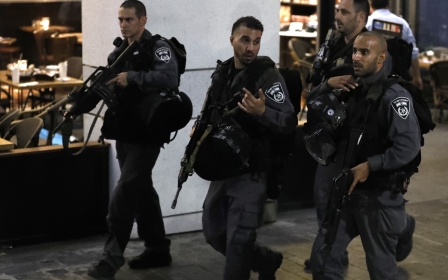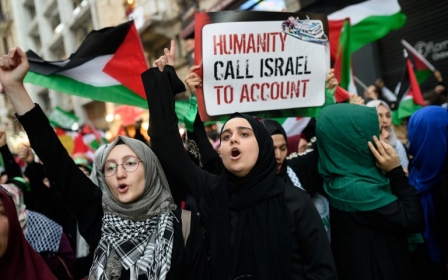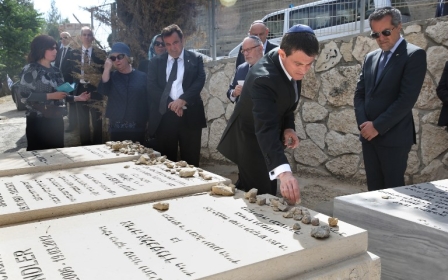UN's Ban urges Netanyahu to make tough choices in farewell visit

UN chief Ban Ki-moon on Tuesday urged Israeli Prime Minister Benjamin Netanyahu to take "courageous steps" toward peace on a farewell visit to Israel and the Palestinian territories.
Ban, whose second term ends in December, visited the Israeli-blockaded Gaza Strip, met Netanyahu and later held talks in the occupied West Bank with Palestinian leader Mahmoud Abbas.
He condemned a recent wave of Palestinian attacks, which he called "terrorism," and said the Gaza blockade was "collective punishment".
During Ban's two terms as UN secretary-general, beginning in January 2007, Gaza has been under Israeli siege, and the strip has suffered three Israeli assaults, in 2008-9, 2012 and the 50-day war in 2014.
While acknowledging the threats facing Israel, Ban said "we must not allow difficulties to become excuses for inaction".
"I encourage you to take the courageous steps necessary to prevent a one-state reality or perpetual conflict that is incompatible with realising the national aspirations of the Israelis and Palestinian people," he said.
"We cannot ignore key underlying causes of violence: growing Palestinian anger, the paralysis of the peace process, the nearly a half-century of occupation."
Israeli settlement-building in the occupied West Bank along with the lack of any progress in peace efforts have helped feed a wave of Palestinian knife, gun and car-ramming attacks and attempted attacks since October, many analysts say.
A number of Palestinians have also been shot and killed by Israeli soldiers during protests and by air strikes on the Gaza Strip over the same time period.
Violence has declined in recent weeks, though attacks continue to occur, including a gun attack at a Tel Aviv cafe on 8 June that killed four Israelis.
"Stabbings, vehicle rammings and shootings have only one name: terrorism," said Ban.
"Incitement to such acts and glorification of their perpetrators are unacceptable and must be stopped," he added.
The Commissioner-General for the UN's agency for Palestinian refugees (UNRWA) accompanied Ban to Gaza. He said the visit came "at a time of deep despair" for Palestinians in the Strip, Maan news agency reported.
“The world needs to pay far more attention,” Pierre Krahenbuhl said.
A senior Hamas leader, meanwhile, slammed Ban's visit, saying it was an effort to push the French peace initiative Hamas opposes.
The visit is “part of the ongoing efforts to resume negotiations to reach a compromise that serves occupation," said Ahmad Bahar.
'Political horizon' needed
He said the UN had “remained silent towards the crime of the Gaza siege for 10 years,” according to Maan. Ban specifically mentioned the Tel Aviv attack, but said security measures would not be enough.
"You need a political horizon," he said. "You need a leadership that is committed to peace and a just and a lasting solution."
Netanyahu called for an end to what he referred to as bias at the United Nations against Israel, citing repeated condemnations of his country.
Israel "does more to promote and protect human rights and liberal values than any other in the blood-soaked Middle East," said Netanyahu.
In Gaza, Ban said the blockade of the Palestinian enclave "suffocates its people, stifles its economy and impedes reconstruction efforts".
"It is a collective punishment for which there must be accountability," he said.
Israeli forces and Palestinian fighters in the Gaza Strip have fought three wars since 2008, and Israel says the blockade is needed to keep out materials that could be used for military purposes.
Later in the evening Ban met Abbas at the Palestinian leader's Ramallah headquarters and again spoke of the need for peace and the difficulties Palestinians face.
"I'm aware that many Palestinians question the feasibility of reaching a just and lasting peace with Israel. They hear talk of peace but they see violence," he said.
"They still live a life of checkpoints, permits, blockade, demolitions and profound economic hardships faced with growing indignities and the humiliating occupation that will soon enter its 50th year."
Abbas said Palestinians seek peace based on a two-state solution and called for "international protection" for his people.
New MEE newsletter: Jerusalem Dispatch
Sign up to get the latest insights and analysis on Israel-Palestine, alongside Turkey Unpacked and other MEE newsletters
Middle East Eye delivers independent and unrivalled coverage and analysis of the Middle East, North Africa and beyond. To learn more about republishing this content and the associated fees, please fill out this form. More about MEE can be found here.




